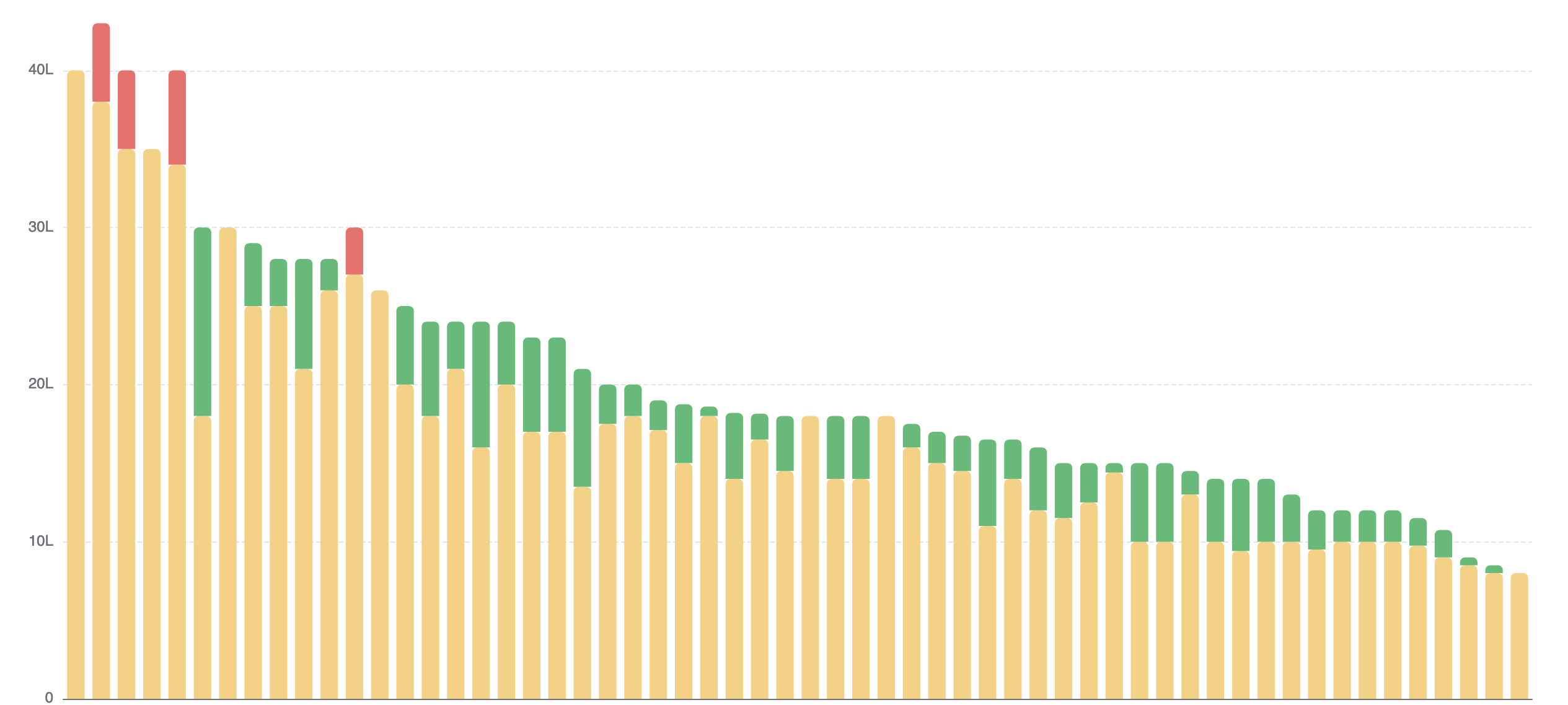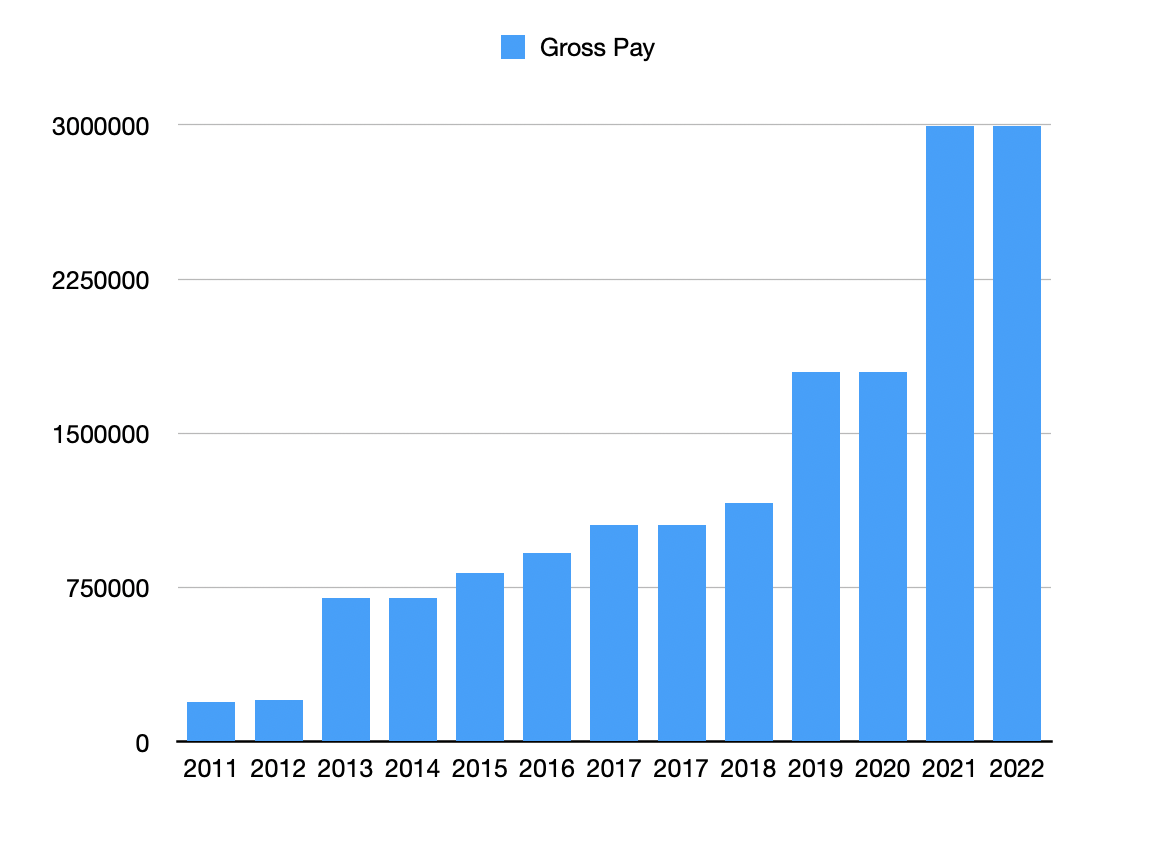Over the last couple of years, Frappe has implemented this radical idea of letting people set their own pay. This is due our belief in equality and that people are smart to make wise choices, and that giving the agency to everyone to set their own benchmarks of performance will help them unlock their own potential. Before we talk about how the pay process went this year, let’s look back on how last year’s choices played out.
Last year’s (2022) process, unlike the year before (2021) was unmoderated. It was also different because tech salaries had skyrocketed. Technology startups were basking in the post-COVID high and had raised gazillion dollars hiring at any cost, not to mention global startups hiring for cheaper tech talent in India. So when the "gates" were opened up at Frappe in 2022, everyone felt incredibly tempted to take what they could. The company gave itself an unprecedented 62% pay hike. It felt like Frappe had become an overnight unicorn. After this euphoria died down, we asked the pertinent question. Okay so how are we going to pay for this? As the CEO, I set up the expectation that we should aim to get 15% profit in our business (which seemed like a wise thing to say) and we agreed that our sales must roughly double if we were to reach this target. And thus the game was afoot.
The first couple of quarters of 2022 we were disappointing. Our sales growth was barely 25%. We had also decided to phase out our services business, which was at that time 30% of our revenue. In hindsight, we had clearly no idea what we were doing. We were way behind our targets and something had to give. Being a democracy, the right thing to do is take a poll. So we had a poll, since we can’t pay ourselves these big salaries, should we take a pay cut, or should we let poor performers go. The clear majority was: Let poor performers go
As the CEO of a small company, the thankless task to identify who to let go, fell on me. I started applying the Keeper’s Test, that is if the person in question resigned, will I or anyone in the company fight to keep them back? For some of the folks, the results were quite clear. These were people whose output was clearly not matching their pay and were struggling. Some smart people resigned when they realised that Frappe isn’t growing as fast as they expected and their job might be on the line. Then things started getting tougher and we had to take harder decisions. Who should be responsible for the dull growth?
People with more pay have more responsibility for earning it. Most of our highest paid colleagues were lateral hires. The lateral hires were also struggling because we have another radical policy - people also get to choose their own work. So if you are a high powered executive at Frappe, you have very little hard power. The way to get things done in Frappe is to have conversations with people and help them see the bigger picture and then collaboratively find a way to work.
Lateral hires found it very difficult to work this way. In most companies, people higher up in the hierarchy take all the calls because they are responsible for the success or failure of their team. In Frappe, people with more experience or team leaders have very little leverage - they have all the responsibility without the power. This seems obvious now, but did not seem so then. So most of our senior lateral hires had to go as well. Through the year, we had to let more than a third of the company go. The remaining people took up the challenge, and revenue did start to look up in the 2nd half. Instead of 100% growth, we ended up at 45%. We survived, but by cutting off some limbs.
With such a setting, as you would expect, people were a lot more circumspect in picking their pay this time around. Not only that, some people were asking if we should even continue with this model. They were worried that we might lose more team members this year as well, and pick-your-own-pay would be responsible for this. I was like “How is freedom responsible for this? If someone misused their freedom, does that mean the freedom was bad, or the misuse?”. Another way to look at it would be that people are not reckless, but that those who left did not find Frappe worthy enough of their ambitions (and neither did they find the agency to do something about it) and would have left sooner or later.
This year we also did a few more things to make the process better. We proposed that everyone should have some measurable goals for the year, so that it becomes clear if they are meeting them or not. There are two dimensions to anyone’s contribution, quantity and quality. One gives volume, the other mass. By setting measurable goals, at least the quantity part of it can be easily identified. The other thing we were comparing everyone’s pay to their market pay both average and premium. For example the average pay for a software developer (1-2 years) would be Rs 5 lakh (0.5 million) but the premium pay would be 20 lakh (2 million).
We also put in a lot more effort in planning. Since we believe everyone has the right to choose their own work, the company’s plan becomes a mix of bottoms up role planning and a broad top down narrative on Frappe’s business strategy. Frappe’s business is now focussed on three things - Enterprise Support, Partner Ecosystem and Frappe Cloud. The product strategy is also to build a suite of products that any business can use and can be commercialised by our cloud and partner ecosystem. Considering this, everyone in the team made their team level plans along with individual plans. Finally we also encouraged everyone to talk to as many people as possible, and told everyone to give honest feedback on everyone’s pay proposal.

Pay hikes for everyone in Frappe (2023) - green bars indicate increase, red indicate decrease. (The decrease is ESOPs, not actual pay)
After all the planning and discussion, people started picking their numbers and they were not as shocking as last year. There was, on an average 15% pay hike, which is much more modest to last year. This year, we have set a modest goal to achieve 50% growth. After all the exuberance of 2022, it seems that things have settled down in 2023. After everyone shared their numbers, we did an anonymous feedback poll for each person. By and large, most people thought everyone’s pay was fair. A few people got the feedback that their pay was too low or too high.
Looking at the numbers together, it seems we have come to a much more equal pay. Since people who are early in their career with lower pay have the same weight (one person, one vote) as someone who has been around for 15 years, and since the company has a lot more younger people than older ones, there will be a bias against the older folks. So in a sense, all of us will grow together in pay, rather than a few senior folk taking on too much pay. The the ratio of the median and highest paid person in the company is roughly 1:2, which is must better than the industry average (for the top 50 companies in the country, this ratio is 1:260). This means that Frappe is a much more equal company (maybe one of the most equal companies with more than 50 employees). This also means that Frappe will never be in a position to hire people at very high pay. The pay also shows that people consider themselves in the top 5% in the industry and as long as we can hold people accountable to those levels, Frappe will continue to attract and retain top performers.
Compared to last year, everyone also seems to have realised that there is a cost to overconfidence and comparison to VC funded startups. In gambling, there is something called as a “risk of ruin”. It means that as a gambler the worst outcome is complete ruin and bankruptcy. So a good gambler takes risks in a manner that allows them to stay in the game. People in Frappe seem to have understood this. Taking very high pay means that you will be under pressure and if you can’t perform, you have a high risk of exit. It is better to think about your pay over five years (if you manage to survive) than just one year.
 Here is my pay for the last decade as Founder / CEO. You have to stay in the game to win.
Here is my pay for the last decade as Founder / CEO. You have to stay in the game to win.
To conclude, there seem to have been several good learnings this year. Focus on measurable goals, planning, long term maturity and equality have all been established. Now if that leads to better outcomes for the team as a whole is yet to be seen!




·
I forwarded the first pat of this story some 2 years ago to some friends and will do the same again. Fascinating story....